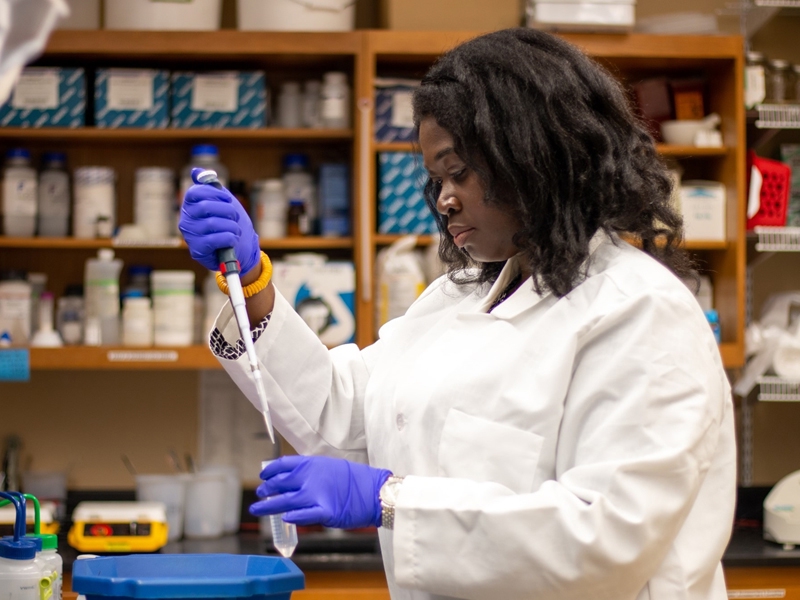Selom Ametepe, an international doctoral student in the Cell and Molecular Biology Program in the Graduate School and International Education of the U of A, won a $50,000 Faculty for the Future Fellowship from the Schlumberger Foundation.
The fellowship program works to accelerate gender equity in the fields of science, technology, engineering and mathematics by breaking down barriers women face in pursuing scientific careers, specifically in developing and emerging nations. Specifically, the fellowships are awarded to women who are preparing for Ph.D. or post-doctoral study in STEM disciplines to pursue advanced graduate study at top universities in their disciplines abroad.
The funds will help Ametepe, who is a native of Togo, focus on her research toward her goal of becoming a faculty member.
"I'm excited about resources to advance my research," Ametepe said. "I'm excited to meet other women working in other STEM fields and getting to know about their research. I want to thank my adviser, Dr. Timothy Evans, for his unconditional support of my academic endeavors which led to me getting this fellowship. I am very grateful to him for creating a positive working environment where he facilitates our learning opportunities."
"I'm proud of Selom's development as a scientist, and I'm delighted that her potential for leadership has been recognized by the Schlumberger Foundation," said Evans, who is an associate professor of biological sciences. "She's been an essential part of our lab for the last couple of years, and I look forward to seeing her continue to grow her scientific and leadership skills with the support of this fellowship."
Ametepe's research focuses on the nervous system in fruit flies in hopes of transferring knowledge to the human nervous system. She is interested in the mechanisms that guide neurons extensions, axons to form connections with other neural or non-neural cells. She focuses specifically on the gene Roundabout3, which is critical to the development of the nervous system. Using a sophisticated genetic engineering technique called CRISPR gene editing, Ametepe is cutting some portions of the gene to see what parts are crucial for the function of the protein.
"My research will help us know specific ways that the gene controls development of the nervous system," she said.
Before coming to the U of A, Ametepe completed her undergraduate studies at the Universite de Lome, where she graduated with a bachelor's in biomedical sciences. She then worked for five years as a lab analyst at the National Institute of Health in Togo.
Her decision to undertake graduate studies was influenced by two people who she considers as role models: her father, who was a dedicated lab technician, and one of her professors, Dr. Satoguina, professor of immunoparasitology.
"Getting close to her and learning her work ethics gave me hopes and wings and reassured me that I could become a scientist as well," Ametepe said.
Faculty for the Future Fellows are expected to return to their home countries upon completion of their studies to contribute to the economic, social and technological advancement of their home regions by strengthening the STEM teaching and research faculties of their home institutions, as well as through their leadership in science-based entrepreneurship. They are also expected to contribute to the public sector ,where their newly acquired technical and scientific skills can help provide evidence-based support for STEM policy making, including topics of gender representation.
Since its launch in 2004, the program has awarded fellowships more than 800 women from 86 countries for Ph.D. and post-doctoral STEM research programs. Faculty for the Future is the SLB Foundation's flagship program, a nonprofit organization that supports science and technology education.
Topics
Contacts
John Post, director of communications
Graduate School and International Education
479-575-4853, johnpost@uark.edu
